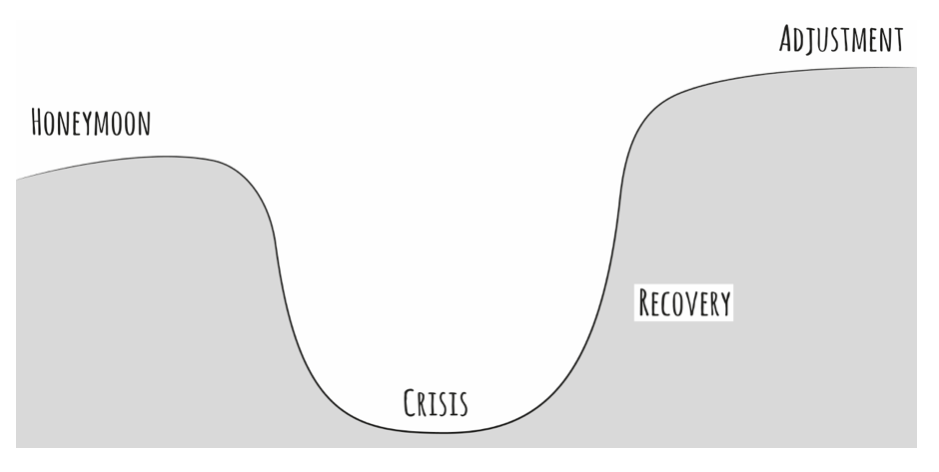Week 1.
You land in your host country. You’re in love.
The energy, the climate, the newness.
It’s all so fresh and bright.
You are thrilled to be here, and you can’t imagine ever NOT being thrilled.
This is the honeymoon period.
Week 2.
You’ve been trying to get your WiFi set up for over a week now.
The service guy hasn’t dropped in yet, even though you’ve called several times.
How are you supposed to work? How are you supposed to talk with your family back home?
You’ve never been more frustrated.
You’re missing home, where things are straightforward and service is immediate.
No waiting around, no wondering what to do. No communicating in broken Spanish.
No confusion.
You’re also feeling lonely, missing your friends and family, and wishing you were back in their comfortable presence.
This is the crisis period.
Week 9.
You’ve been living in your host country for three months.
Your WiFi has long been set up, and you’ve managed to put that crisis in your rearview.
You’ve faced several more in the past few months but, bit by bit, you’re figuring things out.
You’re making friends, eating the local foods, finding great places to go. Some that even remind you of home.
You still fell twinges of homesickness, but you haven’t researched one-way tickets back in weeks.
This is the recovery period.
Week 27.5.
You’ve been in your host country for two years.
You’re well adjusted, and it almost feels like your second home.
You’ve established yourself, have your group of friends, new routines. You’re learning the language, you know your way around.
You’re adapting.
And you’re beginning to admire this new culture.
Things that used to irritate you about it are becoming easier to manage and even endearing.
This is the adjustment period.
Lysgaard’s U-Curve
Norwegian sociologist Sverre Lysgaard’s U-curve is a widely used model for cultural adapting and adjustment.

Lvsgaard hypothesized in 1955 that the inverted bell-curve is a common expat experience.
“Adjustment as a process over time seems to follow a U-shaped curve: adjustment is felt to be easy and successful to begin with; then follows a ‘crisis’ in which one feels less well adjusted, somewhat lonely and unhappy; finally one begins to feel better adjusted again, becoming more integrated into the foreign community.”
These highs and lows might sound familiar to expats and international managers alike.
When adjusting to a culture, you’re bound to face days where you’ve had enough and feel that you’re at the end of your rope.
You may even hide inside and refuse to venture out of your safe space to interact with the locals.
Why? Because going outside will provoke you; it will remind you of all the things that are different about your host country: everything takes longer, people drive insane, you’re sick of the food, the language barriers…
You’ll contrast your host country with your “more civilized” home country, where everything seems right and makes sense.
You’ll resent the illogical nature of this new culture and feel angry about it.
Does this sound familiar?
The Consecutive Cycle
Although many do experience the highs and lows of an adjustment period, subsequent studies found that only 10 percent of those surveyed actually cycle consecutively across these four stages.
For the other 90 percent of expats, things are more confusing.
The feelings may ebb and flow. They might not follow in this order – or you may skip out on some stages altogether.
Or perhaps you won’t experience any of this at all.
Some expats have no honeymoon period whatsoever. They are disappointed and unhappy from the very first day they set foot off the plane.
And for some, that feeling may never change.
But keep in mind, research has shown that the first few months of expatriation are the most stressful.
If you can get over the hump, your honeymoon period just might come later.
Next week, we’ll talk about what to do if your U-curve is actually a knot.

Hold on, since when is 27.5 weeks two years?
LikeLike
Haha, you are right… It’s not even half a year… Good catch! But I hope, that the point I made is understandable despite an obvious lack in mathematical skills. Have a great day.
LikeLike